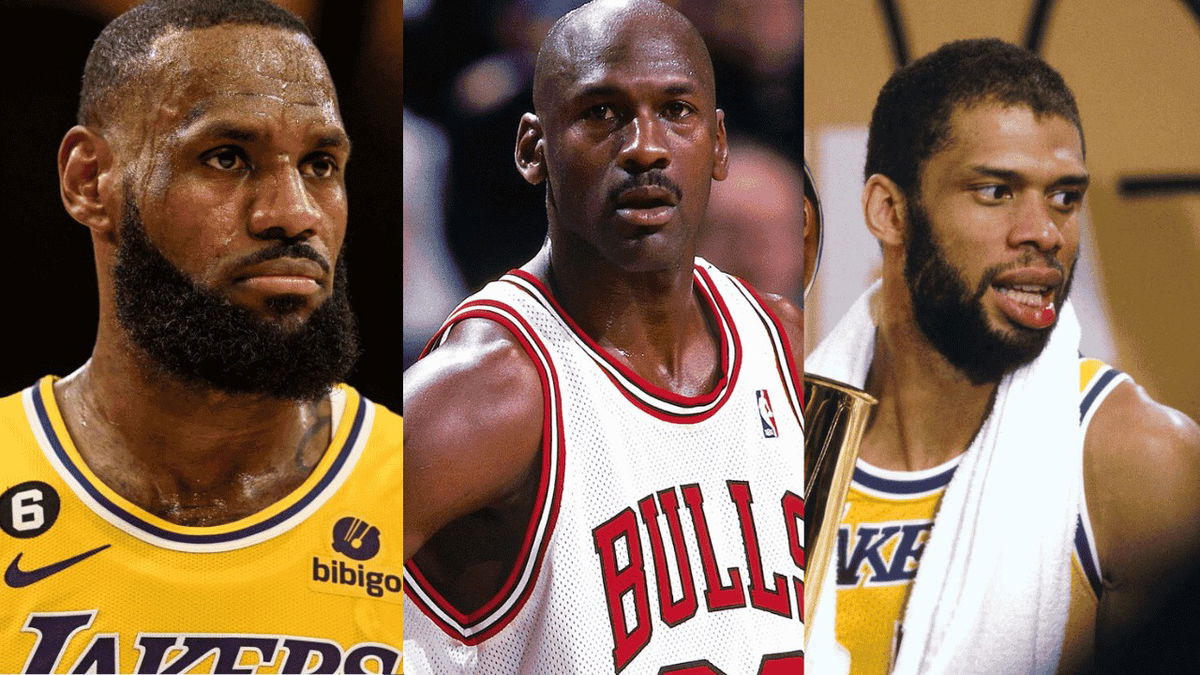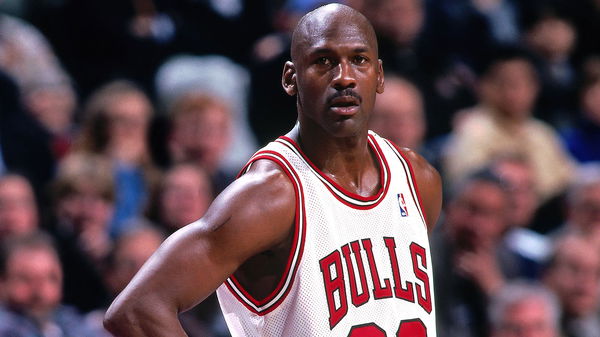
Imago
Unlicensed

Imago
Unlicensed
On April 5, 1984, Kareem Abdul-Jabbar scored his 31,420th point, etching his name in history, breaking Wilt Chamberlain’s record with his trademark skyhook in Las Vegas, setting a standard that stood untouched for decades. Fast forward to February 7, 2023, in Los Angeles. With 10.9 seconds left in the third quarter against the Oklahoma City Thunder, he rose from the left elbow and sank a fadeaway jumper, scoring his 38,388th point and surpassing Kareem to become the NBA’s all-time leading scorer. Michael Jordan, for all his dominance, never climbed that mountain.
Watch What’s Trending Now!
Across 15 seasons, ending with his last game on April 16, 2003, Jordan scored 32,292 points, good for fifth all-time. In a full season, Jordan’s career-high total of 3,041 points in 1986–87 has remained unmatched since. So it also reopened an old question: Why couldn’t Michael Jordan, arguably the greatest pure scorer the game has ever seen, climb that mountain?
Jordan’s career was split by retirements, first in 1993 and again in 1999, which cost him prime scoring years. As former Bulls teammate Stacey King explained on his podcast, “If MJ would have not missed those two years or came in early from high school… maybe he could have done it.” King was referring to Jordan’s shocking retirement from basketball in October 1993, just months after completing a third straight championship with the Chicago Bulls. At the peak of his powers, Jordan walked away following the murder of his father, James Jordan Sr., and pursued a brief professional baseball career with the Chicago White Sox organization. Those two seasons away from the NBA, 1993–94 and most of 1994–95, cost him thousands of potential points.
ADVERTISEMENT
The effect on his scoring trajectory was massive. In his first nine seasons, Jordan averaged 31.5 points per game and had already collected seven scoring titles. Two more full campaigns at that blistering pace could have added roughly 5,000 points to his career total, putting him far closer to Kareem’s record of 38,387. Instead, Jordan returned in March 1995 wearing No. 45, just in time for a playoff run cut short by Orlando. Unlike LeBron, who has averaged over 27 points per game across 20 seasons and counting, Jordan’s shorter window left him thousands shy of Kareem’s total. And it’s here that the two main reasons for the gap become clear.
By the following season, he reclaimed his dominance, winning another three scoring titles and three more championships, but the gap on Kareem had widened. “Maybe if he could have played early like LeBron, these guys, maybe he could have done it,” Stacey observed, pointing out that Jordan had entered the league late by staying at North Carolina for three years. LeBron James, by contrast, debuted at 18 and was already scoring 20 points a night as a rookie. The extra seasons and uninterrupted stretch of production gave James the longevity Jordan never had. It is rare to get to that point. Nobody had it easy, and if anyone apart from the two was, Karl Malone.
ADVERTISEMENT

ADVERTISEMENT
King also pointed to Karl Malone as an instructive example. “I thought Karl Malone had a chance to do it,… I mean, this is a guy averaging 30 points every year… You thought he would be able to do it, and I think he’s in top five, and he wasn’t able to do it.” Malone finished with 36,928 points, good for second all-time until LeBron passed him in 2019. He played 19 seasons, missed very few games, and still fell short of Kareem. Jordan’s two retirements (1993–95 and again from 1999–2001) plus his later comeback with Washington, where his averages dipped into the low 20s, left him even less margin to chase down the record. Even if the two reasons are personal, Jordan would still have made it. At least Horace Grant, part of the Chicago Bulls’ first three-peat, felt so.
“Back when we played, it was more or less lots of defense, but now the scoring is up here just because of the rule change and the three-point shots and… analytics,” he said, referencing the game’s evolution. Veteran Larry Bird once joked that analytics were simply “what I see with my own two eyes,” but the shift is undeniable: today’s game is built for offense.
Stacey linked it to the “moneyball effect,” where efficiency and spacing drive production the way the Oakland A’s used numbers in baseball. Kareem thrived through longevity and an unstoppable skyhook. Jordan dominated a more physical, defense-heavy era but sacrificed years in his prime. LeBron has combined durability, adaptability, and a modern offensive environment. That’s why King believes LeBron’s record will “probably sit there… we’ll be somewhere in the afterlife, baby, when somebody is trying to break that record.”
ADVERTISEMENT
The Last Dance and the Shadows of Jordan’s Legacy
ADVERTISEMENT
Even with Michael Jordan’s fishing triumphs, NASCAR battles, and rare glimpses into his private life, the shadow of his playing days continues to follow him in the present. The controversy surrounding The Last Dance shows that for all his accomplishments, Jordan’s legacy is not just measured in records or business ventures but also in the memories and resentments of the teammates who helped build his dynasty.
Five years after its release, The Last Dance still sparks division, especially among Jordan’s former teammates. On Stacey King’s Gimme the Hot Sauce podcast, Horace Grant admitted he regretted participating at all: “Once I saw it, they cut that thing like, sliced it up… I could not believe how much they cut it up and made the majority of us look incompetent.”
His frustration mirrors that of Scottie Pippen, who has long claimed the series unfairly diminished his role. To Grant, the editing choices painted him and Pippen as side characters in Michael Jordan’s myth, rather than the foundational pieces of Chicago’s first three-peat. Stacey King added context to this, defending Pippen’s much-criticized “1.8 seconds” incident and pointing out that it had no bearing on the second three-peat:
ADVERTISEMENT
“Anything that happened in that first three-peat had nothing to do with the second three-peat. Nothing.” His words underscore a larger truth: while The Last Dance immortalized Jordan for a new generation, it also deepened old wounds for those who lived the dynasty with him. And unlike records that fall or trophies that fade, these portrayals, fair or not, are etched permanently into the public imagination.
ADVERTISEMENT
ADVERTISEMENT
ADVERTISEMENT